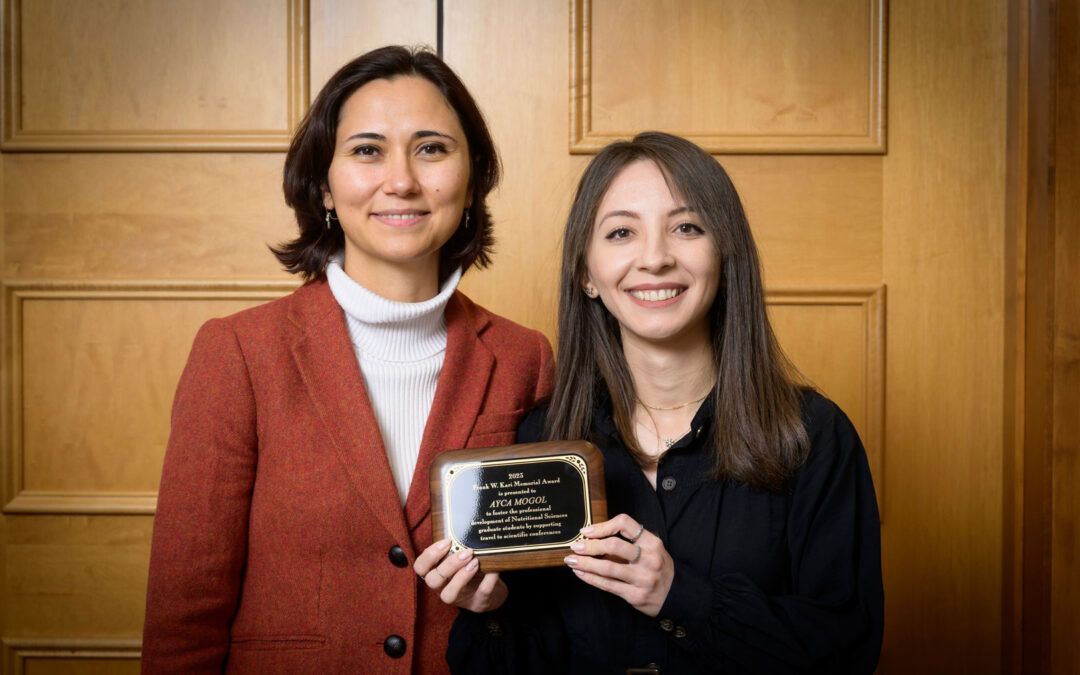Cancer Center at Illinois Program Leader Zeynep Madak-Erdogan and Research Assistant Ayca Nazli Mogol
Illinois researchers have identified a metabolic pathway inhibitor with reduced toxicity and improved efficacy of therapeutic regimens and outcomes for metastatic breast cancer patients.
Approximately 70% of breast cancers express estrogen receptor-α (ERα), providing a potential target for endocrine therapy. However, 30 to 40 percent of patients with ER+ breast cancer experience recurrence and metastasis at a 24% relative survival rate within five years. Metastasis occurs when tumor cells proliferate beyond the bounds of the origin site, finding their way to secondary sites.
Researchers in Cancer Center at Illinois Program Leader Zeynep Madak Erdogan’s lab identified nicotinamide phosphoribosyltransferase (NAMPT) – an essential enzyme in nicotinamide adenine dinucleotide (NAD+) metabolism – to be increased in metastatic breast cancer (MBC) cells treated with fulvestrant (Fulv).
“One of the issues with therapeutic inhibitors is that you inhibit something, and then tumor cells stubbornly find another way to compensate for that. But in the case of our team’s experimental model, we’ve identified a target pathway that is essential to the metastatic breast cancer cells. No other compensatory pathways were activated. It’s a welcome surprise and a great strength of this study,” said Zeynep.
The team’s research exhibits a desirable synergy of the NAMPT inhibitor KPT-9274 with Fulv, reducing metastatic tumor burden. The researchers performed RNA-sequencing analysis, revealing that the NAMPT inhibitor and Fulv combo reversed the expression of gene sets associated with more aggressive tumor phenotypes. Furthermore, the researchers’ metabolomics analysis showed that NAMPT inhibition reduced the abundance of metabolites related to several critical tumor metabolic pathways.
“The biggest problem with current NAMPT inhibitors in the market is toxicity. Our inhibitor shows a low toxicity profile with our lab’s animal model. I am very hopeful that our inhibitor will be quite promising in future clinical trials,” said first author Ayca Nazli Mogol.
The team’s novel strategy of targeting metabolic adaptations in endocrine-resistant MBC is an alternative approach to improve the therapeutic response of metastatic ER+ tumors. The findings uncovered meaningful dialogue between ERα and NAMPT in MBC and the utility of NAMPT inhibition and antiestrogen combination therapy in reducing tumor burden and metastasis. These results provide a promising path toward the potential of an innovative approach to MBC treatment.
“Our research suggests that we have a good alternative therapy for patients with metastatic breast cancer. By inhibiting this particular metabolic pathway, we might be able to prevent the development of resistance to metastatic breast cancer treatments,” said Madak-Erdogan.
Editor’s notes:
The paper, “NAD + Metabolism Generates a Metabolic Vulnerability in Endocrine-Resistant Metastatic Breast Tumors in Females,” was published in Endocrinology and is available online. DOI: 10.1210/endocr/bqad073
This work was supported by grants from Karyopharm Therapeutics (investigator-initiated grant to Z.M.E.), the University of Illinois, Office of the Vice Chancellor for Research, and National Institute of Food and Agriculture, U.S. Department of Agriculture (award ILLU-698-909 to Z.M.E.). Research reported in this publication was supported by the Cancer Scholars for Translational and Applied Research (CSTAR) Program sponsored by the Cancer Center at Illinois (CCIL) and the Carle Cancer Center (under award No. CST EP082021 to A.N.M.).
Zeynep Madak Erdogan is a Sylvia D. Stroup Scholar of Nutrition and Cancer, an Associate Professor in Food Science and Human Nutrition, an Associate Dean of the Graduate College, and the CCIL Education Program Leader.
To contact Zeynep Madak Erdogan, please email zmadeke2@illinois.edu.
This story was written by Jonathan King, CCIL Communications.

